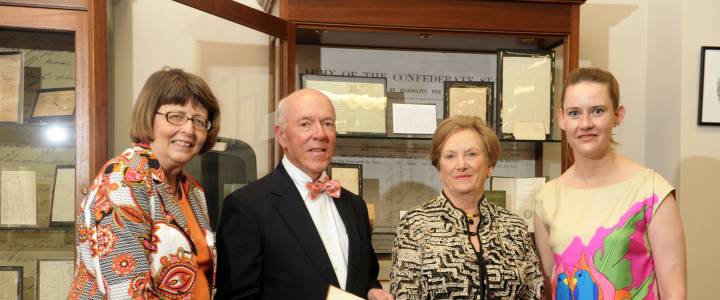(OXFORD, Miss.) – Dr. D.J. Canale of Memphis, a retired neurosurgeon, has spent years collecting rare books related to Civil War history, particularly the medical treatment of soldiers in the field. The medical historian and his wife, Janet, have now donated their collection to the University of Mississippi to be available to other historians, researchers and the general public.
“Dr. and Mrs. Canale’s gift of more than 100 items is the largest donation of Civil War-era medical and non-medical books and treatises to the Archives,” said Jennifer Ford, director of the J.D. Williams Library’s Archives and Special Collections. “It fills a gap in our collection and is a very significant contribution to the department. We are honored that they chose the University of Mississippi as a home for this wonderful collection.”
The donation of books comes as many libraries, organizations and historians mark the sesquicentennial of the Civil War in 2011. The J.D. Williams Library also is adjacent to the university’s first building, the iconic Lyceum, which served as a hospital to both sides during the conflict.
Canale, who also has collected rare books on other subjects for decades, sold a large group of his books in the last few years at Christie’s and Swann Auction Galleries in New York but felt his Civil War-related books should be kept together. When he read about a gift that alumnus Don Barrett of Lexington had made to support UM’s new Center for Civil War Research, Canale said he visited the Oxford campus; met with John Neff, associate professor of history and center director; and decided the books should become part of the Archives and Special Collections.
“My book collection is composed of first editions and primary sources, and I am really pleased to keep the collection together,” the physician said. “After I decided the J.D. Williams Library would be a perfect home, I also learned that Jennifer Ford’s doctoral studies focused on the Civil War. My collection is not entirely medically related; I made a conscious effort to obtain other rare books related to the Confederacy because my two great-grandfathers fought in this war.”
Several books and manuals from the Canale collection are already on display as part of “This Fiery Trial: An Exhibit on Mississippi and the American Civil War,” which runs through September 2011. Of particular note is Dr. J. Julian Chisolm’s Manual of Military Surgery for the Use of Surgeons in the Confederate States Army, which was one of the main works used by surgeons in the field and in hospitals. Also on display is a piece on gunshot wounds that Ford described as “particularly rare” as well as a work on the science of amputations. Some of the non-medical books provide definitive accounts of the hardships women and children in the South suffered when the Northern forces came through.
Canale said that important medical discoveries came from the conflict.
“The most common operation during the Civil War years was amputation, and there were thousands of them performed on both sides,” he said. “Joseph Lister was two years away from discovering the germ theory and the antiseptic method of applying a germ-killing substance during surgery. What physicians learned was the incidence of infection and gangrene was very high if they did not use amputation to treat compound wounds. Field surgeons did determine that they should amputate these mangled extremity wounds early instead of wrapping them up in gauze and putting the soldiers on trains to travel three to four days to a general hospital. They also discovered that when they isolated patients, infections didn’t spread to the other soldiers.”
In addition, the Chimborazo Confederate Hospital in Richmond, Va., consisting of 100 wards with five different surgical services was an early prototype to the pavilion hospital that made the delivery of health care more efficient with less chance of the spread of infections, Canale said.
The physician’s interest in the history of medicine led to his pursuit of acquiring books that were important in that study, said Canale, who has written articles and book chapters on medical history. His fascination with rare books spread to other subjects, and to build their collection, he and his wife visited bookstores that featured rare books wherever they traveled. In addition, he added books to his collection from auctions and catalogs and has even operated Old South Books, a rare and antiquarian book business since 1978.
Canale, who retired 11 years ago, earned his undergraduate and medical degrees from the University of Tennessee and completed his residency at the Henry Ford Hospital in Detroit, Mich. He and his wife are the parents of three grown sons, including one, Stuart Jay Canale of Memphis, who received undergraduate and juris doctor degrees from UM. The Canales have a second home in Oxford and enjoy attending university events.
Since 1975, the purpose of the UM’s Archives and Special Collections has been to acquire, conserve and make accessible rare books, manuscripts, maps, visual and audio materials, and ephemera related to UM, the state of Mississippi and the Blues. Located on the third floor of the J.D. Williams Library, Archives and Special Collections is open from 8 a.m. until 5 p.m., Monday through Friday, except during selected university holidays.
Tina Hahn

